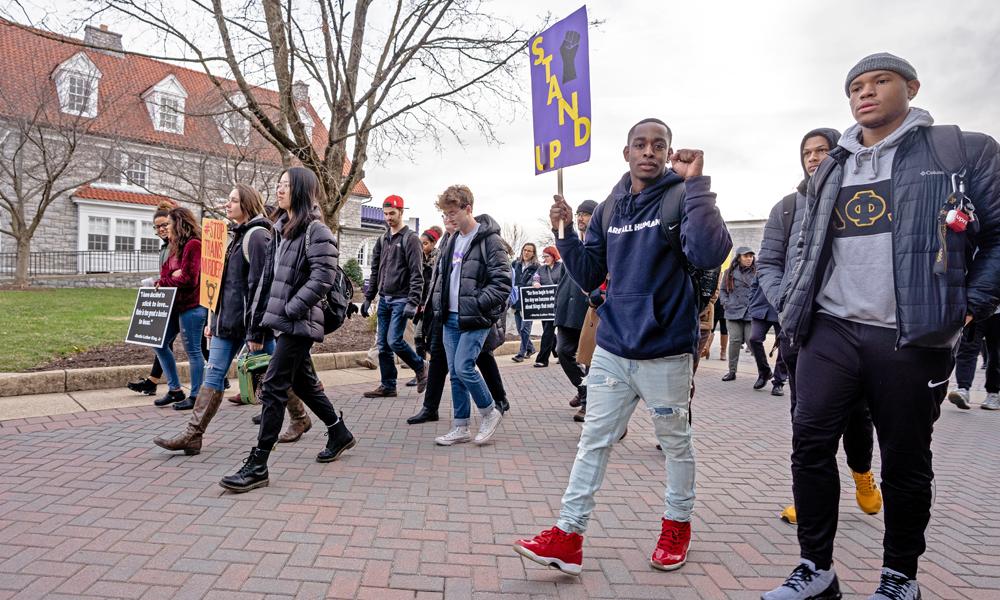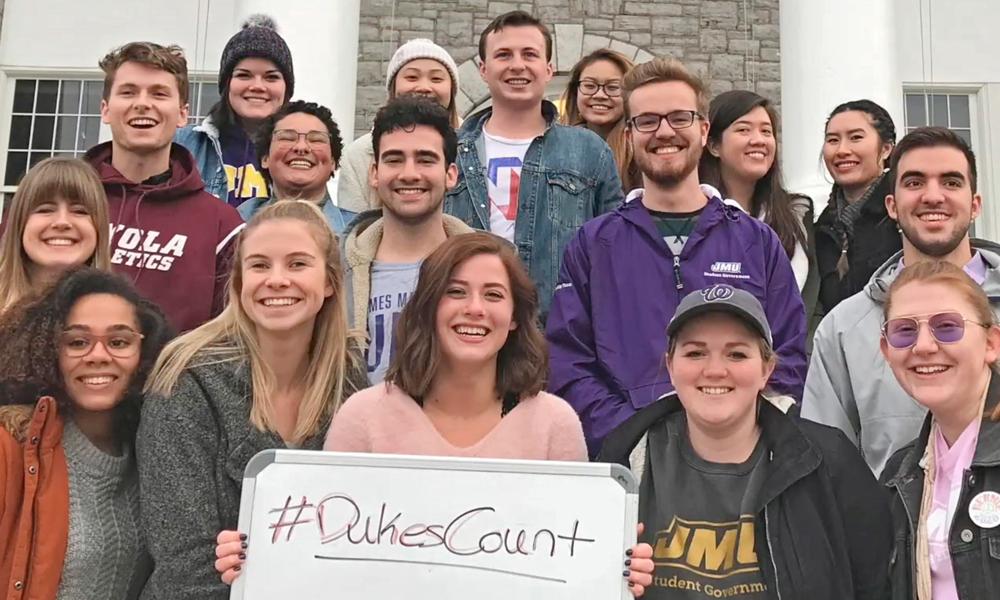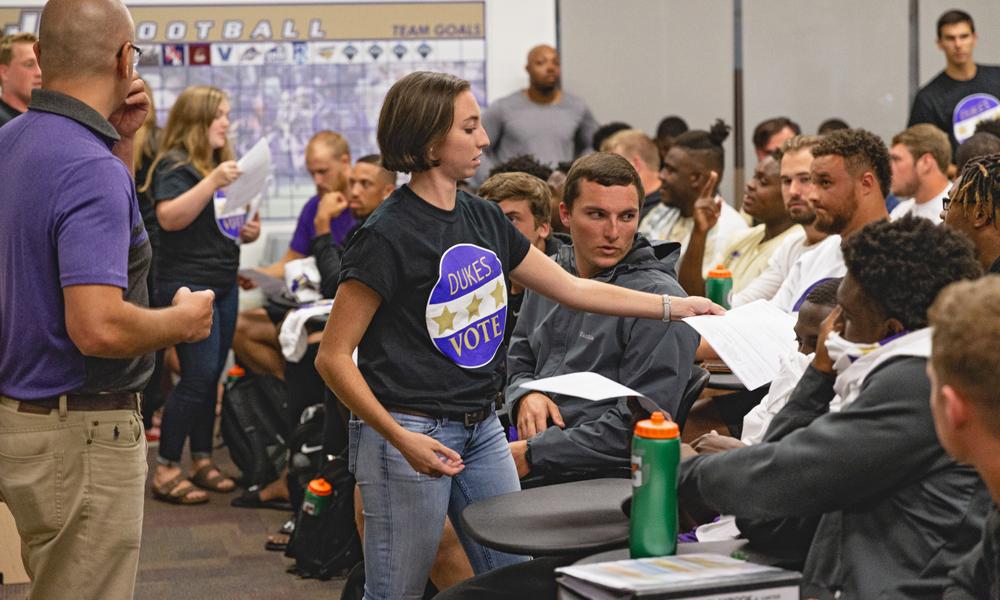Reimagining democracy
What comes to mind when you hear the word democracy?
Nation and World
SUMMARY: Democracy is a term open for interpretation depending on an individual's perspectives, writers from the James Madison Center for Civic Engagement assert.
By Aaliyah McLean (’20), Woodson Martin Democracy Fellow, James Madison Center for Civic Engagement and Carah Ong Whaley, associate director, James Madison Center for Civic Engagement
What comes to mind when you hear the word democracy? Democracy can be an amorphous term that individuals interpret differently based on their perspectives, education, backgrounds and positions. Deep divisions over the nature and meaning of democracy have threatened its very survival. We are living in one of those defining moments.
In 2020, conversations about what is broken with democracy have centered around deeply rooted racism in America that has created racial gaps across every system, including ability; health; education; income; exposure to pollutants; access to food, clean air and clean water; adequate medical treatment; and interactions with the criminal justice system. Conversations have also centered around the COVID-19 crisis, and the economic disruption and resulting uncertainty have become yet another major test of the strength and resilience of our democracy.
However, for more than a decade, scholars and observers have been warning that democracy is in decline, as evidenced by a lack of faith in democratic institutions, retrenchment of voting rights, the influence of money in politics, the concentration of power not reflective of the larger population, and declining percentages of young people who consider it essential to live in a democracy. Some of the most pressing questions before us are: How we can reimagine and rebuild our democracy? What values should serve at its foundation?
While there are many different definitions, one useful way to think of democracy is as a process of collective decision making in which there is some degree of equity among participants and a commitment among the participants to accept the outcomes. Democracy can take different forms with varying degrees of depth. At a minimum, a democratic process might entail individuals voting in an election. More meaningful participation includes working in coalitions on a pressing issue for the broader public good. Such coalitional work is characterized by participants who are informed and treated as equal collaborators and contributors; and open, fair, transparent and accountable processes that seek regular input from the public at all stages of decision making. Democracy can be practiced in different settings, whether as an individual, family, organization, campus, corporation, community, country or international organization.
Justice has long been central to the idea of practicing democracy. In arguing for the U.S. Constitution, James Madison wrote in The Federalist Papers, Number 51: “Justice is the end of government. It is the end of civil society. It ever has been and ever will be pursued until it be obtained, or until liberty be lost in the pursuit.” By “justice,” Madison, who was referencing Aristotle, meant that the purpose of society and government is to make it possible for individuals within that society to reach their highest potential, to flourish and to thrive.
But the Constitution itself was unjust, creating exclusionary practices and institutions that did not allow every individual to flourish. Rather, what a select few agreed to at the time created a social, political and economic structure that benefited an elite, white, male, landowner class and embedded the bondage and enslavement of fellow human beings as central to American democratic institutions, economy and society. Struggles for freedom, rights and justice for every member of our society have been waged by groups originally excluded in the Constitution and willing or forced to sacrifice for a greater good. But moments of progress toward a more just and inclusive democracy, such as after the Civil War and during Reconstruction or the passage of the Civil Rights Act, have often been met with backlash and regression, and through laws and court cases that have created barriers to political and economic participation and representation.
As our nation continues to grapple with what is broken, at James Madison University, we are reviving the idea of justice as central to conversations about the future of democracy because it creates a sense of shared responsibility and links us together in a common pursuit of ensuring that every individual thrives. Martin Luther King Jr. expressed this idea when he said, “Injustice anywhere is a threat to justice everywhere. We are caught in an inescapable network of mutuality, tied in a single garment of destiny. Whatever affects one directly, affects all indirectly.”
Similarly, women’s rights activist Fannie Lou Hamer succinctly said, “Nobody’s free until everybody’s free.” Without justice, democracy becomes a tool of exclusion, oppression and control, especially in times of crisis. Still, democracy can also be the means for dismantling injustice by creating more equitable and inclusive institutions, policies and decision-making processes.
To ensure that democracy is just, there must be constant reflection and engagement around its purposes and how it is accessed and practiced. As an institution of higher learning, JMU has committed to facilitating opportunities for students, faculty and staff to develop the knowledge, skills and dispositions necessary to be informed participants in a democracy. Participation can take many forms—from staying informed on issues and discussing them with others, to voting, to protesting, to contacting public officials, to attending local meetings, to empowering others to run for elective office.

As Desmond Tutu said, “If you are neutral in situations of injustice, you have chosen the side of the oppressor.” During these pressing times, “Being the Change” at JMU must include collective action by students, faculty and staff on racial and social justice.
As a result of conversations in the wake of the police killings of George Floyd, Ahmaud Arbery, Breonna Taylor, Rayshard Brooks, Tony McDade, Sean Reed and too many others—and as result of the advocacy of students, alumni and faculty—President Jonathan R. Alger made a strong recommendation to the Board of Visitors to remove the names of Confederate military leaders, who represent racism, oppression and treason, from three campus buildings. It is a step in the right direction, but there is much still to do.
JMU provides students with multicultural centers and resources to discover a sense of belonging, but as an institution we still need to build a framework for inclusion and equity within our various divisions. It’s on us to build the next group of leaders who will cultivate attitudes of equity and inclusion and advocate for every group. As an institution, we need to question and challenge our budgets, programs and initiatives. Are we equipping our students to be the next change agents within our communities to create a more just society? Do they leave feeling a sense of purpose and agency to do the work? We expect additional progress as Athletics, Student Affairs, student organizations and faculty critique their structures and commit to new and redesigned programs and courses that better incorporate racial and social justice goals.
Your voice matters
This year, JMU has also been deeply involved in working at the local, state and national levels to ensure a complete count in the 2020 census. Mandated by the Constitution, the census is the basis for political representation because the population count determines how congressional seats are allocated among the states and how legislative district lines are drawn. Census-derived data also determines how federal funds are allocated to states and local communities. James Madison was a foremost advocate of the census because he believed that decision makers should have an understanding of the population in order to make good policies and decisions that would affect different sectors of society. The census has presented an opportunity to educate and engage students, as well as to lead efforts to build a more just and inclusive democracy. The census is also a chance to empower communities that have been traditionally left out of political and decision-making processes.
Working with students as co-educators and co-creators, JMU emphasizes the value of voting to exercise agency and as a means of full participation in democracy. Initiatives through the James Madison Center for Civic Engagement work not only to register students to vote and apply for absentee ballots, but also to deliberate about major issues like racism and social justice, the economy, public health crises, the environment and immigration, just to name a few.

At JMU Civic, students lead efforts to engage in politics through learning-centered, action-oriented dialogues in public spaces, both on campus and virtually. Students also have opportunities to learn about why voting matters for the issues they care about and how to register to vote during classroom visits by trained undergraduate volunteers, in first-year and transfer student Orientation, and even at the University Recreation Center. With support from JMU Civic and political science professors, students also produce a nonpartisan voter education guide that is distributed throughout campus and the community. Prior to voter registration deadlines, students facilitate a town hall with elected officials and candidates in campus residence halls to literally meet students where they are.
On Election Day, with support from the Center for Inclusive Music Engagement, music education students contribute their talents by performing at our campus precinct to build a culture that celebrates democracy. Election night features live coverage of returns by JMU’s student media organizations from our Election Night Watch Party. Post-election, students and faculty participate in a panel to analyze and discuss what results mean for governance.
As we join efforts to dismantle racism, respond to a pandemic of tremendous ferocity and scope, make sure everyone counts in the 2020 census and encourage full and informed participation in elections, JMU is exercising its collective creativity to solve problems and build a more just and inclusive democracy.
As we reimagine democracy, we must ask ourselves hard questions. What does democracy need from us? What skills and resources will you contribute? How can traditionally marginalized, oppressed, disenfranchised, underserved and underrepresented voices be heard? What are the values and ideals you want to see? What are you willing to sacrifice for the greater public good?
We challenge you to join in this work with us. Democracy depends on people who can engage in thoughtful, innovative ways about the complex challenges we face, with a diversity of opinions around us and a sense of responsibility for each other’s success and well-being. Your voice matters.

